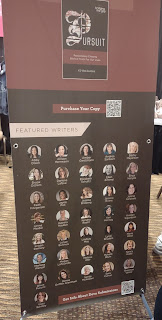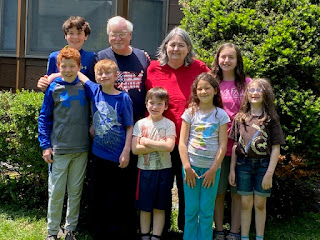Research for the Creative Blogger
I will be the first to admit that my idea of research is doing a Google search for the birthdate of the lead guy in the Hallmark movie I’m watching. If I’m feeling really excited, I’ll also research the female lead and her character’s father, mother, and sister, as well as the town mayor. Research can be a bit daunting or seem a bit dry, unless you are researching something you’re really excited about, like the best washing machine for your family or how to get spaghetti sauce stains out of your favorite yellow sundress. Okay, so you probably aren’t excited about those particular research topics. I understand. Research, for many, feels overwhelming and limited to necessity, but what if you could research something you were really interested in and then share that research with your closest friends in a format that suits you? That sounds a bit more appealing, right? Well, you’ve come to the right place because I’m here to share some very simple basic research info with you that I have been using for an upcoming blog project.
How to know what you need to research…
Once you have determined the topic you want to research, I recommend, as do many others, that you come up with a plan for your research, including a particular focus. The plan can be as basic as a list of questions:
· What do I plan to research?
· What is my particular focus concerning this topic?
· Why do I want to research this topic?
· Who knows a lot about this topic?
· When can I interview them, and what questions should I ask them regarding my topic?
· Where can I learn more about my topic: a library, a historical society, a museum, a website, a company’s headquarters, a book? (So many options for this question.)
· Will there be any difficulties in gaining information through these various channels? If so, how can I overcome those difficulties?
*Determine, based on the questions above, what you need to research. Be aware: Even when a bit of research seems as though it may not fit into your plan, don’t disregard it completely because it may end up being a new angle you hadn’t thought of before.
Where to find sources…
For my upcoming project, I found sources in a variety of unexpected places. When I say unexpected, I mean creative. Most of the research I’ve done for schoolwork over the years has been strictly academic – peer-reviewed journals from trusted online academic databases. However, for my upcoming project, I learned about the joys and fun involved in creative research. For creative research, you can look to games, movies, personal interviews, songs, your attic, diaries, journals, photographs, radio broadcasts, etc. The list is almost endless. Some of my resources include:
· Spouse-ology – A game made by FamilyLife.
· Date idea books – Look for books on your topic of interest.
· Marriage books – Look for books on your topic of interest.
· Personal interviews – In person is best, when possible. But you can also do a written interview using a list of pre-planned questions sent via email. The responses from your interviewee will be genuine and unique.
· Online articles – Search trusted sources for your topic of interest. One of my articles is from Focus on the Family, a ministry I trust.
· A date box – What unique resources would be helpful in researching your topic? Trying out a canoe at the camp store? Listening to birdsong online? Trying out a mail order cooking box with one of your children?
*Sources for your topic can vary widely in format. Not all research can be found in an online database. Your topic may call for more creativity than most research projects, but that doesn’t mean the research can’t be done. Sources are as unique and diverse as researchers and writers themselves.
How to know if a source is credible and appropriate for your project…
Look for sources that are secure, when searching online. Avoid sources with a strong political agenda, especially if politics have no bearing on what you are researching. Books should be authored by known names in the field of your research. Oscar the Grouch will be no use to you if you are researching the cause of hurricanes near Florida or the way coffee beans are harvested. If you want to know how to get to Sesame Street, Oscar the Grouch may be able to help, but otherwise his credibility is likely lacking.
Not only do you want to use credible sources, but you also want to use sources that are appropriate to your specific topic/project. Part of knowing if the source is helpful in this way is considering your audience. Who is your audience? Will the source mean something to that audience? Will the use of the chosen source magnify what you are trying to say, or will it detract from your main point/argument? Sometimes the decision may be difficult. In that case, ask your spouse, a trusted friend, your intended audience, or your teacher/professor for input.
How to incorporate sources into your writing…
Since the research I am currently working on is for a series of blog posts, I will be incorporating my research in various forms throughout my series of posts. I may include some amazing quotes that speak well to my topic. I may describe playing a game and how it could be beneficial to others. I may describe the pros and cons of a certain date night box. Sources can be incorporated into your writing in a variety of ways – through statistics, photographs, reviews, quotations, and countless other ways. When using sources in your writing, please remember to give credit where it's due. Tell readers who you’re quoting and from what book or article. Tell readers the name of the game you are discussing and who the designer or manufacturer is. Tell readers who you interviewed, possibly including a little background about the person (with permission of course). Never claim a game or idea is yours (unless it truly is), even if it is one you’ve slightly altered. Make sure you point readers back to the original idea at the website, in the book, or from the person where you found it. Intellectual theft is no better than any other kind of theft, so give proper credit.
Where to find more information…
There are numerous sources to help you along as you pursue research. Here are a few to get you started:
· The Art of Creative Research: A Field Guide for Writers by Philip Gerard published in 2017. – I consulted this source for this post. Mr. Gerard does a thorough job of explaining how to do creative research in an engaging way.
· A post about research in creative writing at Berries and Barnacles: Life in the Pacific Northwest – Doing a general Google search, I found this fairly concise post with some helpful tips.
· The Craft of Research written by Wayne C. Booth and four others published in 2016. – A google search for “creative research for writing” will garner an extensive list of possible useful options. The Craft of Research appears to be a good option.
A few final thoughts…
Early on in this post I mentioned sharing your research in a format that suits you. For the purposes of this post, I mostly focus on using your research for a writing project. Your writing project could be poetry, an essay, a short story, a novella, a non-fiction book, a fiction book, a series of blog posts, a magazine article, and so many other written pieces. Remember one other thing, your format of presentation may not be written at all, and that is completely okay. You may present your research in a painting, a quilt, a series of postcards, a diorama, or something else equally as unique and fitting to who you are. Enjoy the research journey because when you’re researching something you’re excited about it can be surprisingly pleasant.


Comments
Post a Comment